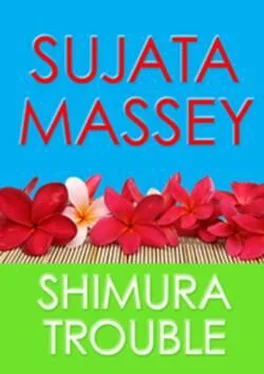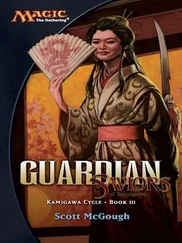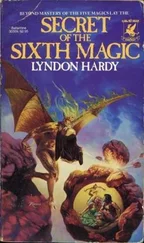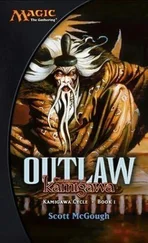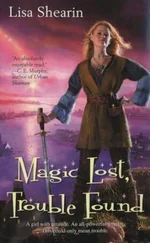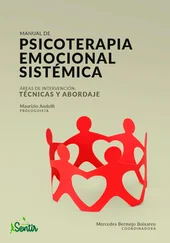
Sujata Massey
Shimura Trouble
The tenth book in the Rei Shimura series, 2008

Rei Shimura- part-time antiques dealer and part-time spy, at a loose end once again
Toshiro Shimura and his wife Catherine- Rei’s parents
Hiroshi Shimura and his son Tsutomu (Tom) Shimura- Hiroshi’s only brother and nephew from Yokohama; Rei’s closest Japanese relatives
Michael Hendricks- a spy who loves Rei but can’t quite come in from the cold
Yoshitsune Shimura- a first-generation American of Japanese ancestry born in Hawaii; the son of Keijin Watanabe Shimura and Harue Shimura, Toshiro and Hiroshi Shimura’s long-lost aunt
Edwin Shimura- Yoshitsune’s son, who is married to Margaret, and father to the teenagers Braden and Courtney
Kainoa Stevens- owner of the Aloha Morning coffee shop
Charisse Delacruz- coffee shop barista
Calvin Morita- Japanese-American psychiatrist
Albert Rivera- land manager and ‘luna’ of Pierce Holdings
Mitsuo Kikuchi and his son Jiro- a Japanese developer and son
Josiah Pierce II- the oldest living member of the Pierce land-owning family
Kurt Schaefer, Parker and Karen Drummond, and Eric and Jody Levine- Michael’s old school friends from the Naval Academy, and their wives
Hugh Glendenning- Rei’s former Scottish lawyer boyfriend

IN THE SHIMURA family, several variations of family titles are used to express relationships such as grandfather, grandmother and uncle. Respect to elders is shown by incorporating the prefix ‘o’ and the suffix ‘-san’ into most family titles. However, Japanese people who settled in Hawaii mostly spoke peasant dialects, and their descendents still carry on with more casual titles.
Ojiisan : Most typical way of addressing a grandfather. Variations are ojii-sama (super polite) and jii-chan (most informal)
Ojisan (with a short ‘i’ sound): Uncle
Okaasan : Grandmother. A variation used in this book is the more casual kaa-chan
Okasan (with a short ‘i’ sound): Aunt
Otoosan : Father
First names are often followed by the suffix -chan, meaning “little one’, or “-kun’ (‘guy’). This affectionate suffix is widely used for children, teenagers, and now between friends in their twenties and thirties. Thus, Rei Shimura is called Rei-chan by all family members older than she is, and she sometimes addresses her male cousin Tsutomu as Tom-kun.
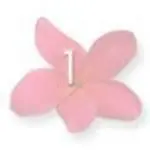
WHEN MY FATHER almost died, I made a deal with God. If he improved, so would I.
Deals are what I know. In the beginning, they were just for Japanese antiques. More recently I’ve dealt with international secrets, but I’m trying to keep that a part-time affair. This particular deal didn’t have a great chance of succeeding, given my father’s prognosis, and my own status as a lapsed Buddhist-Episcopalian-whatever. Still, I would give it my all. If my father lived, I would stop being such a run-around. I wouldn’t drink too much, overspend on clothes or pine after men who would never be mine. I already had a guy in my life: Otoosan, my very own Honorable Mister Father.
MY FATHER HAD been out of San Francisco General Hospital for a few days, and I’d been granted leave to nurse him at home, when the letter came. Despite the circumstances, in a strange way it was good to be back at my childhood home on Octavia Street-the renovated Edwardian house that always seemed to smell of furniture polish and narcissi. The only kitchen smell missing was soy sauce. Because of its high sodium content, it was banned from my father forever.
We’d been talking about giving up things we loved, my psychiatrist father and I, during our daily constitutional-a mid-afternoon walk through Pacific Heights. It was slower for my father now, and we skipped the hills altogether. When we arrived home, a sheaf of mail lay on the Tibetan rug in the entry hall. My father started to stoop to pick it up.
“No sudden up and down movements!” I said as I dove down smoothly before him. My father had suffered a cerebral hemorrhage, and the new precautions he would follow for the rest of his life were varied. My father grumbled lightly, then settled himself on a carved Chinese elm bench to switch his walking shoes for house slippers while I sorted the mail. A bill from Neiman Marcus: I wouldn’t let him see it. Less problematic was the bill from Pacific Gas and Electric, and the San Francisco Opera circular. As I was starting to discard junk mail, a slim letter fell out of the pages of the neighborhood’s advertising mailer.
The handwriting was unfamiliar, as were the foreign-sounding street, Laaloa, and town, Kapolei. Still, it bore a US stamp. When I scrutinized the postmark, though, it all made sense. Honolulu, HI.
I had been there once, for a study-abroad botany course at the end of my high school career. That summer spent traveling through parks and gardens, with a bit of Waikiki bar hopping, was one of my best ever, although my father had grumbled that after earning my certificate, I still couldn’t tell the difference between plumeria and the Tahitian gardenia.
“Otoosan, you have a letter from Hawaii.” I handed over the letter with a flourish. I was dying for him to rip it open on the spot.
“Honto?” Truly? my father asked, turning it over slowly. He’d been in the US for over thirty years, so of course he was fluent in English, but he persisted in speaking Japanese with me during the times we were alone together. I thought about answering in Japanese, but decided to stick with English because I was feeling distracted.
“Probably it’s a time-share offer or something. These marketers have gotten quite skilled at making their envelopes look personal.”
“But the name on the envelope is Shimura. What a coincidence.”
“Why don’t you sit down at the table to properly examine everything?” I suggested. “I’ll make you a cup of green tea.”
While I waited for the water to boil, I heated the teapot and thought about how slow my life had become. I’d never thought the arrival of a handwritten letter could be the most intriguing part of my day. A few months earlier I’d fought for my boss’s life and my own in a dank Tokyo garage, as part of my occasional work as an informant for the Organization for Cultural Intelligence, a secret American government group. The woman I’d been, dressed in a winter-white Yves Saint Laurent trench coat and patent-leather boots, was a far cry from the current me slouching around in a Japan-America Society T-shirt and yoga pants. Now I had plenty of exercise, and time to sleep and read. I was only slightly bored.
I set a tray with the tea, a strainer, and my favorite cha-wan, a rough teacup made by a famous Japanese potter. When I went out to the dining room, my father had clearly finished the letter, and had set it in my place.
“This letter…it’s remarkable. It’s made me feel better than anything since my surgery.” My father looked at me eagerly. “Please, take a look.”
Читать дальше
